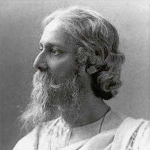Dwarkanath Tagore is one of the first Indian industrialists and entrepreneurs, was the founder of the Jorasanko branch of the Tagore family, and is notable for making substantial contributions to the Bengal Renaissance.
Background
Dwarakanath Tagore is a descendant of Rarheya Brahmins of Vandyopadhyay division. He was the second son of Nilmoni Thakur from his first wife Menaka. Menaka was the younger sister of Alakasundari, wife to Rammoni's elder brother Ramlochan, who was childless. Soon after his birth in 1794 Dwarkanath was informally adopted by Ramlochan and Alakasundari and formally adopted in 1799.
Education
His early education and upbringing was within the family home (Thakur Bari), but at age 10 in 1804 he was admitted to Sherbourne's school on the Chitpur Road and become one of Mr. Sherbourne's favourite pupils.
Career
On 12 December 1807, Ramlochan died leaving all his property to his adopted son Dwarkanath, who was then a minor. This property consisted of zamindari estates governed by the complicated Regulations of Permanent Settlement introduced by Lord Cornwallis in 1792. The Zamindars were the ruling authority of a certain sub-division or region under The British ruling authority in India and they (the Zaminders) had the authority to collect tax or to rule their fellow residents inside the territory of their Zamindaris on behalf of the British Government in India. Therefore, to participate in the Zamindari left by his adopted father Ramlochan Takhur as the forth-coming Zaminder, Dwarkanath left school in 1810 at the age of 16 and apprenticed himself under a renowned barrister at Calcutta Robert Cutlar Fergusson and shuttled between Calcutta and his estates at Behrampore and Cuttack.
Dwarkanath Tagore was of the firm conviction that at those times "the happiness of India is best secured by her connection with England". Dwarkanath was no doubt a loyalist, and a sincere one at that, but he was by no means a today. Servility was as far from his character as was lack of generosity from his nature. He was also firm in defending the interest and sentiments of his people against European prejudices. With this in view he established on 21 March 1838 an Association for Landholders (later known as the Landholder's Society). The association was overtly a self-serving political association, founded on a large and liberal basis, to admit landholders of all descriptions, Englishmen, Hindus, Muslims, and Christians. What is interesting is that cut across racial and religious divides being founded along with his old rival Raja Radhakanta Deb with whom he had earlier founded the Gaudiya Sabha. It was the first political association in India to ventilate in a constitutional manner the grievances of the people or a section of them that were outspoken. From this grew the British Indian Association, the precursor to the Indian National Congress.
Tagore was a western-educated Bengali Brahmin and an acknowledged civic leader of Kolkata who played a pioneering role in setting up a string of commercial ventures—banking, insurance and shipping companies—in partnership with British traders. In 1828, he became the first Indian bank director. In 1829, he founded Union Bank in Calcutta. He helped found the first Anglo-Indian Managing Agency (industrial organizations that ran jute mills, coal mines, tea plantations, etc.) Carr, Tagore and Company. Even earlier, Rustomjee Cowasjee, a Parsi in Calcutta, had formed an inter-racial firm but in the early 19th century, Parsis were classified as a Near Eastern community as opposed to South Asian. Tagore's company managed huge zamindari estates spread across today's West Bengal and Odisha states in India, and in Bangladesh, besides holding large stakes in new enterprises that were tapping the rich coal seams of Bengal, running tug services between Calcutta and the mouth of the river Hooghly and transplanting Chinese tea crop to the plains of Upper Assam. Carr, Tagore and Company was one of those Indian private companies engaged in the opium trade with China. Production of opium was in India and it was sold in China. When the Chinese protested, the East India company transferred the opium trade to the proxy of certain selected Indian companies, of which this was one. In 1832 Tagore purchased the first Indian coal mine in Runigunj, which eventually became the Bengal Coal Company. Very large schooners were engaged in shipments. This made Dwarkanath extremely rich. And there are legends about the extent of his wealth.
A restless personality, with a firm conviction that his racial identity was not a barrier between him and other Britons as long as he remained loyal to the British Sovereign, Tagore was well received by Queen Victoria and many other British and European notables during his two trips to the West in the 1840s; he died in London after a brief illness.








